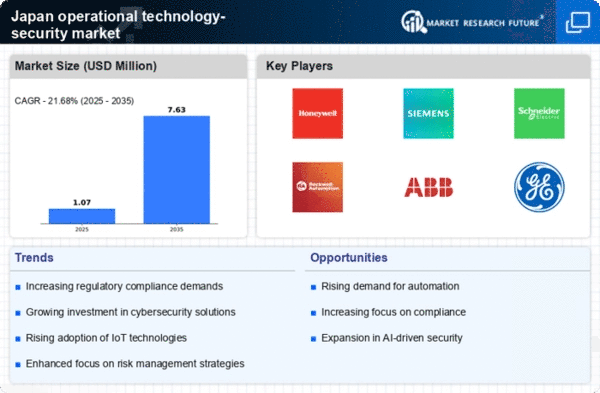Rising Cyber Threats
The operational technology-security market in Japan is experiencing a surge in demand. This surge is due to the increasing frequency and sophistication of cyber threats.. As industries become more interconnected, the potential attack surface expands, making critical infrastructure more vulnerable. Reports indicate that cyber incidents targeting operational technology systems have risen by over 30% in recent years. This alarming trend compels organizations to invest in robust security measures to protect their assets. The operational technology-security market is thus witnessing a significant uptick in the adoption of advanced security solutions, including intrusion detection systems and threat intelligence platforms, to mitigate risks associated with cyber threats.
Increased Regulatory Scrutiny
The operational technology-security market in Japan is influenced by heightened regulatory scrutiny. This scrutiny surrounds data protection and cybersecurity.. Recent legislative measures have mandated stricter compliance requirements for organizations operating critical infrastructure. As a result, companies are compelled to enhance their security protocols to meet these regulations. The operational technology-security market is likely to see a growth rate of around 20% as businesses invest in compliance-driven security solutions. This regulatory landscape not only drives demand for security technologies but also encourages organizations to adopt best practices in operational technology security, ensuring the integrity and availability of their systems.
Focus on Resilience and Recovery
In the face of increasing cyber threats, the operational technology-security market in Japan is witnessing a shift towards resilience and recovery strategies. Organizations are recognizing the importance of not only preventing attacks but also ensuring rapid recovery in the event of a security breach. This paradigm shift is leading to the adoption of advanced incident response plans and disaster recovery solutions. The operational technology-security market is expected to expand as companies prioritize investments in technologies that enhance their resilience against cyber incidents. This focus on recovery capabilities is crucial for maintaining operational continuity and minimizing the impact of potential disruptions.
Investment in Smart Manufacturing
Japan's commitment to advancing smart manufacturing technologies is driving growth in the operational technology-security market. The government has initiated various programs to promote Industry 4.0, which integrates IoT and automation into manufacturing processes. As companies adopt these technologies, the need for enhanced security measures becomes paramount. It is estimated that the operational technology-security market could grow by approximately 25% over the next five years, fueled by investments in secure smart factories. This trend highlights the necessity for organizations to implement comprehensive security frameworks that safeguard their operational technology environments against potential vulnerabilities.
Collaboration with Technology Providers
The operational technology-security market in Japan is benefiting from increased collaboration between organizations and technology providers. As companies seek to bolster their security postures, partnerships with cybersecurity firms are becoming more prevalent. These collaborations facilitate the development of tailored security solutions that address specific operational technology challenges. The operational technology-security market is projected to grow as organizations leverage the expertise of technology providers to implement comprehensive security strategies. This trend underscores the importance of collaboration in enhancing the overall security landscape, enabling organizations to better protect their critical infrastructure from emerging threats.
















